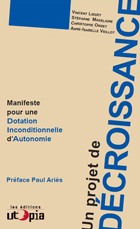VENICE, Sep 25 2012 – “Degrowth is today not only an invitation to abandon the obsession with growth and the collective imagination based on unlimited growth, but also the most comprehensive effort to deal with the major phase of discontinuity our civilization is facing ” The third international degrowth conference in Venice, Italy.
News reports are constantly teeming with stories about conflicts in many developed countries around actual economic crisis. Our economic models that are based on continue growth and production development cannot keep this model any longer. Alternative approaches are being discussed. Among them is Degrowth. In general terms, it is an alternative model to economic growth and also sustainable development. It proposes an alternative paradigm of humanity development, based on significant reduction of energy and material in use. In search of clarity about the paradigm, I went to 2012 Degrowth Conference in Venice.
Despite of rain, Venice labyrinth streets and limited funding I managed to find the place that united different range of people under the umbrella of degrowth. Hippies, scientists, economists, architects, agriculture specialists were all enjoying the presentations and discussions. Lying under suddenly appearing sun or sitting inside the rooms of the architectural university of Venice, I was still searching for the answers.
In the general panel, speakers were talking about global development and economic growth. Changing slide by slide they were proving that GDP is not the best measurement of human wellbeing. Moreover, some slides show how GDP growth can contradict with the level of happiness. In other words, they were proving scientifically the old proverb « money does not bring happiness« . Discussions were heated and financial Gurus were arguing about debts, money, banks and policies. I was often skeptical in these discussions and finding myself wondering about these arguments.
After panel presentations, I entered the room where architects and urban planners gathered along bringing degrowth into the city planning. “Degrowth can be a solution for the growing urbanization and global population growth” was the main massage from the discussion. Among many discussed strategies, they mentioned more effective utilization of the space, reuse of old building, recycling of the existing structure and improving community living, such as urban gardens and so on. Degrowth city would use less, pollute less, growth less, produce less waster, making real sense of the famous quote from German architect Mies van der Rohe: “Less is More”. Therefore I learned degrowth in architecture and urban planning is about scaling down.
Later, I joined the group of transport specialists discussing the future of bike riding societies. They taught me, degrowth is about using less energy or not using it at all. I was surprised to learn that some of the participants arrive to Italy by own bike. They travel all the way from Spain, helping people on the way and promoting sustainable living (read more on http://www.ecotopiabiketour.net/). “It is possible and we are examples” mentioned one the participants. “It was the happiest time in my entire life” – added another biker –“we were biking for one month. We slept in tents and cooked food on the road. But nature around, friends, songs and smiles is something I will never be able to see at my work, steering at the computer monitor”.
From the bike lovers I moved to the agriculture specialists and they taught me degrowth is about producing without pesticides, locally (thus liming transportation) and producing together (community based). They explain to me the concept of permaculture that is based on self-maintained agricultural systems (read more http://permacultureprinciples.com/ ). They also taught me about forgotten tradition of herbal based medicine and explained the negative effects of current pharmaceuticals industry.
I moved forward and entered the room full of emotional discussions. These were artists talking about art being part of degrowth. They were dreaming about art that belong to people and not expensive galleries. Oppression theatre, open installations and exhibitions are just some of the examples.
From the artists, I moved to the environmental scientists’ discussion concerning natural resources management. Talking about limiting chemicals production, based not on the proven hazardous of the chemicals but on the “needness” of the chemicals. They criticized a current model where chemicals are produced and released almost uncontrolled, as soon as there is economic benefit.
After such a productive walk, I lay down on the grass and was looking at the blue Venecian sky. But all of sudden, I have got a new company. As I found out later, the young man was a part of a new youth movement called “Dumpster diving”. It is a movement of young people that are trying to find food in trash bins. No, don’t think they are doing it because of hunger. They are doing it partly because of saving food and partly because of protesting against the waste society we are living. “It is terrible to think about how much food is being wasted, while some people are suffering from hunger. How much is wasted and after all it will end up polluting environment” explained my new friend and added “ It is not disgusting. Most of the time food is totally fine and even hermetically packed”. He gave me a chocolate and continue “sometimes only 1 out of a 100 oranges is spoiled” . I am not sure if I would go bin hunting, but I do understand the message from him – safe the food and stop wasting!
While I was searching for a single answer I found several different ones. I am not sure if they are the most representatives examples of degrowth. They are definitely not the widest overview of the degrowth developments but they do provide a better picture of the concept.
Oksana Udovyk
Degrowth conference in Venice


